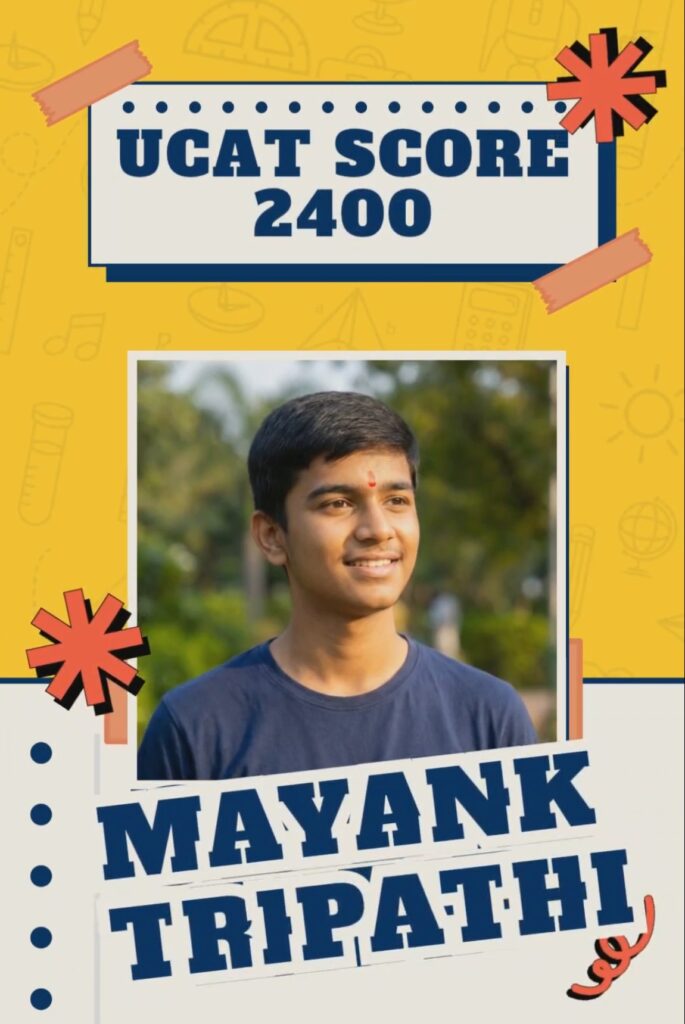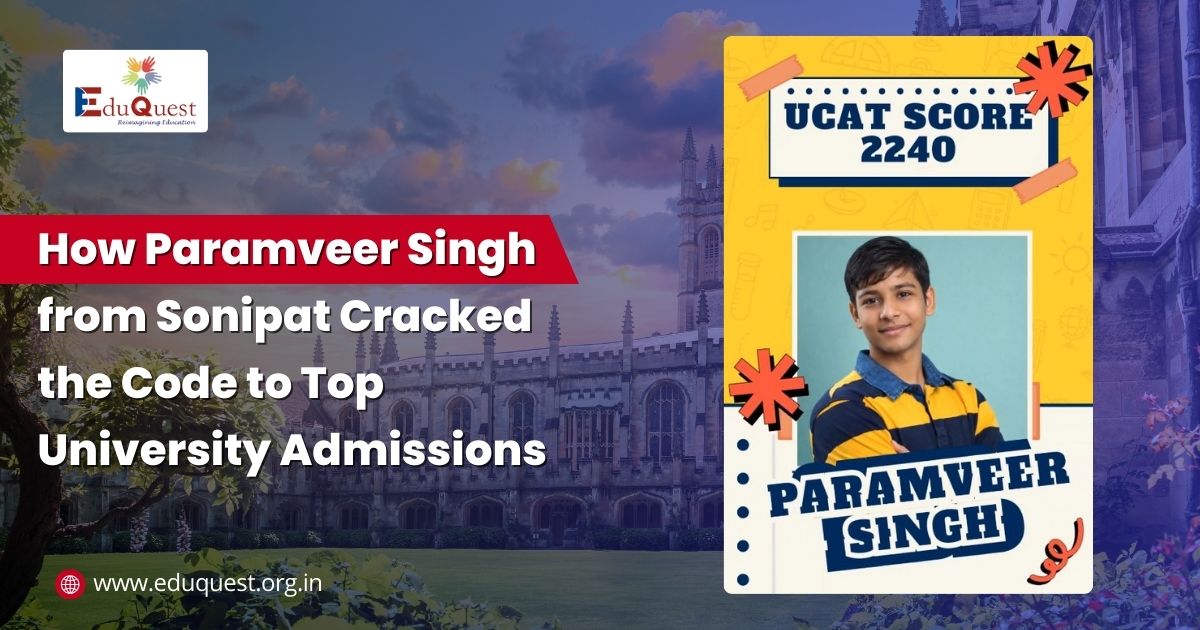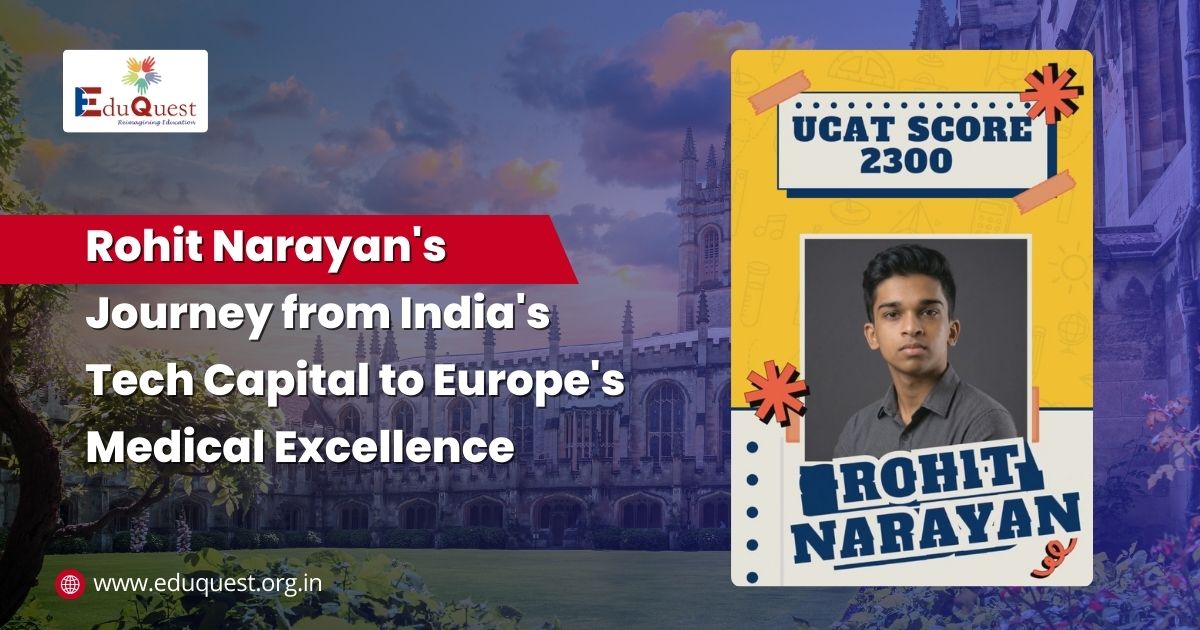UCAT Preparation with EduQuest | Welcoming Future Doctors





UCAT (University Clinical Aptitude Test), or as known previously as the UKCAT, is an admission test or medical entrance exam most widely accepted and approved as a part of the selection process to a consortium of universities through the United Kingdom, Australia, and New Zealand. After establishing itself as an international entrance examination, in 2019 it changed its name from the UK Clinical Aptitude Test (UKCAT) to what it is presently known as UCAT. Now there has been considerable changes in the exam structure of UCAT 2025-2026.
The fundamental difference that it claims to have to other medical entrance exams is that UCAT assesses both cognitive and non-cognitive skills of the applicant aspiring to be a successful clinician. However, the UCAT exam does not stand single but is part of other admission processes like the academic qualifications and Universities and Colleges Admission Service (UCAS) application. It is not particularly an academic achievement in terms but is rather designed as an opportunity to stand out of the crowd proving one’s aptitude and attitude to demand for a program of study.
All-in-One Medical Admissions Support
1. UCAT Exam Preparation
- Live online one-to-one classes with UCAT experts.
- Targeted practice in all five UCAT sections: Verbal Reasoning, Decision Making, Quantitative Reasoning, Abstract Reasoning, and Situational Judgement.
- Personalized strategies to maximize scores.
2. Medical School Application Guidance
- Support for UK UCAS applications.
- Tailored guidance for Australian and New Zealand medical school applications.
- Personal statement drafting and profile alignment with university expectations.
3. Mini Interview (MMI) Preparation
- Training for Multiple Mini Interviews, a common requirement at leading medical schools.
- Mock interviews covering ethical dilemmas, teamwork scenarios, and problem-solving questions.
- Confidence-building to perform under real interview conditions.
4. One Fee – Complete Guidance
Unlike other services that charge separately, EduQuest offers UCAT preparation, application support, and MMI training under one fee, making it easier and more affordable for families.
BMAT is Out – UCAT is In!
Starting from the 2024 admissions cycle, the BMAT (BioMedical Admissions Test) is no longer offered. Students aiming for medical and dental schools in the UK, Australia, and New Zealand must now take the UCAT (University Clinical Aptitude Test).
At EduQuest, we provide comprehensive UCAT preparation, medical school application guidance, and Mini Interview (MMI) training — all under one program and one simple fee structure.
Why UCAT Matters for Medical School Admissions
The UCAT exam is a critical requirement for entry into top UK, Australian, and New Zealand medical and dental schools. Unlike standard academic tests, UCAT evaluates:
- Problem-solving and logical reasoning
- Decision-making under pressure
- Quantitative reasoning and data analysis
- Abstract reasoning
- Situational judgement and ethical decision-making
Performing well in UCAT is your first step towards securing a place in medicine or dentistry programs abroad.
EduQuest UCAT Preparation: All-in-One Medical Admissions Support
We are more than just a UCAT test-prep center. EduQuest guides you from exam prep to final admission interviews.
- UCAT Exam Preparation
- Live online one-to-one classes with UCAT experts.
- Targeted practice in all five UCAT sections: Verbal Reasoning, Decision Making, Quantitative Reasoning, Abstract Reasoning, and Situational Judgement.
- Personalized strategies to maximize scores.
- Medical School Application Guidance
- Support for UK UCAS applications.
- Tailored guidance for Australian and New Zealand medical school applications.
- Personal statement drafting and profile alignment with university expectations.
- Mini Interview (MMI) Preparation
- Training for Multiple Mini Interviews, a common requirement at leading medical schools.
- Mock interviews covering ethical dilemmas, teamwork scenarios, and problem-solving questions.
- Confidence-building to perform under real interview conditions.
- One Fee – Complete Guidance
Unlike other services that charge separately, EduQuest offers UCAT preparation, application support, and MMI training under one fee, making it easier and more affordable for families.
Why Choose EduQuest for UCAT Prep?
- One-to-One Live Online Classes – Flexible, personalized, and globally accessible.
- End-to-End Mentorship – From test prep to interviews, everything included.
- Experienced Faculty – Mentors with a proven record of helping students enter top medical and dental schools worldwide.
- Global Reach – Trusted by students from the UK, Australia, New Zealand, India, and beyond.
Key Updates in UCAT 2025: Stay Informed with EduQuest About Your UCAT 2026 Exam
UCAT is a two-hour online examination that focuses primarily on a series of mental abilities as recognized, advised, practiced, and held important by the universities for being eligible to possess expertise in the fields of medical / dentistry / clinical services.
There are two variants of the test:
- Standard test
- Extended test
Note: Extended test entitles extra time in cases of medically documented medical conditions or disabilities of an applicant.
Big Updates for UCAT! Discover the Important Changes in UCAT 2026 with EduQuest
Planning a career in medicine or dentistry in the UK, Australia, or New Zealand? The University Clinical Aptitude Test (UCAT) remains a key component of the admissions process. As one of the most trusted assessments for aspiring healthcare professionals, the UCAT measures a wide range of cognitive skills and personal attributes essential for success in the medical field.
With important changes introduced for UCAT 2026, EduQuest is here to guide you through every detail. Whether you’re sitting for the UCAT in 2025 or preparing for future cycles, here’s everything you need to know to tackle the exam confidently and strategically.
UCAT 2026: Big Changes, Smart Strategies — Stay Ahead with EduQuest
If you’re targeting medical or dental schools in the UK, Australia, or New Zealand, the University Clinical Aptitude Test (UCAT) remains a crucial part of your admissions journey. And for 2025, significant changes are being introduced that you must understand to strategize your preparation effectively.
Let’s break it all down.
🔄 What’s New in UCAT 2026?
✅ Removal of Abstract Reasoning Subtest
The Abstract Reasoning subtest has been completely removed.
UCAT 2025 now includes 3 cognitive subtests and 1 non-cognitive subtest:
Verbal Reasoning
Decision Making
Quantitative Reasoning
Situational Judgement Test (SJT)
This shift allows for more focused preparation and removes a subtest many students found unpredictable. Use this change to your advantage!
📊 Score Compatibility Update
The overall UCAT score will now be out of 2700, reduced from 3600.
The UCAT Consortium has assured that individual subtest scores will remain comparable with those of previous years.
🧠 Section-Wise Breakdown of UCAT 2026
Verbal Reasoning
🔺 Time increased by 1 minute
🕒 Instruction time: 1.5 minutes
📌 44 questions in 22 minutes
Decision Making
🔺 Time increased by 6 minutes
➕ 6 additional questions
🕒 Instruction time: 1.5 minutes
📌 35 questions in 37 minutes
Quantitative Reasoning
🔺 Time increased by 1 minute
🕒 Instruction time: 2 minutes
📌 36 questions in 26 minutes
Situational Judgement Test (SJT)
No changes in time or question count
🕒 Instruction time: 1.5 minutes
📌 69 questions in 26 minutes
🧩 Worried About Abstract Reasoning Being Removed?
Don’t be. Here’s how to turn this into a strategic advantage:
✅ One less subtest = more time to focus on remaining sections and schoolwork.
✅ The skills you’ve developed while preparing for Abstract Reasoning are transferable to Decision Making and Quantitative Reasoning.
✅ Use this change to be more intentional and precise in your UCAT prep.
✅ Start early! The cognitive skills required take time and targeted practice to master.
📚 New Resources & Where to Find Them
🆕 New official UCAT practice tests launch on 1st March 2025.
🎯 Until then, continue using current free official prep materials.
🎓 For structured learning and expert guidance, choose EduQuest — offering one-on-one lectures, personalized mentoring, and high-quality study resources to help you crack UCAT 2025.
🎯 Top Tips for Preparing for UCAT 2026 — from the Experts at EduQuest
✅ Get Familiar with the Exam Format
Understand the structure, instructions, and question types in each subtest. Use the UCAT official website and EduQuest-curated prep guides to get started.
✅ Practice Under Timed Conditions
The UCAT is time-pressured. Practice full sections with time limits to build stamina and pacing skills.
✅ Use Mock Tests & Practice Papers
Simulate real exam conditions using mock exams. Repetition is key to speed, accuracy, and confidence.
✅ Focus on Weak Areas
Identify your weaknesses early and devote extra practice time. EduQuest mentors help personalize your preparation based on regular diagnostics.
✅ Stay Calm and Positive
Work on exam-day mindset. Use breathing techniques, focus drills, and EduQuest’s time-tested strategies to reduce anxiety and stay focused.
✅ Leverage Study Guides & Online Tools
Make use of EduQuest’s premium UCAT prep tools, or explore reliable online resources and apps that offer insights, tutorials, and practice sets.
🔗 Final Thought
UCAT 2026 is not harder — it’s just different. With the right guidance and smart strategies from EduQuest, you can confidently face the changes and ace the exam. Start your preparation early and give yourself the best shot at a successful application to your dream medical or dental school.
🎓 UCAT 2025 — Important Dates, Costs & Deadlines
Planning to apply to medical or dental schools in the UK, Australia, or New Zealand? Mark your calendar with these crucial UCAT 2025 deadlines — all of which are before the UCAS deadline of 15 October 2025.
📅 UCAT 2025 Key Dates
| Event | Opens | Closes |
|---|---|---|
| UCAT Account Creation (Registration) | 13 May 2025 (9:30 AM BST) | 19 September 2025 (12 Noon BST) |
| Bursary Scheme Applications | 13 May 2025 (9:30 AM BST) | 26 September 2025 (4 PM BST) |
| Access Arrangements Applications (for extra time or accommodations) | 13 May 2025 (9:30 AM BST) | 16 September 2025 (12 Noon BST) |
| Test Booking | 17 June 2025 (6:00 AM BST) | 19 September 2025 (12 Noon BST) |
| UCAT Testing Period | 07 July 2025 | 26 September 2025 |
📝 UCAT Results
You will receive your test results immediately after completing the exam.
Your scores will be automatically sent to your selected universities in early November 2025, after the UCAS application deadline.
The UCAT score is valid only for the 2025 entry cycle, including deferred 2026 entry.
💷 UCAT 2025 Test Fees
| Test Location | Cost |
|---|---|
| Within the UK | £70 |
| Outside the UK | £115 |
🎓 Note:
Apply for the UCAT bursary if you meet the eligibility criteria to get your exam fee waived. Make sure to submit the bursary application before 26 September 2025 (4 PM BST).
🧑⚕️ Access Arrangements
If you have a documented disability or medical condition requiring extra time or other accommodations, apply early for Access Arrangements through the UCAT website (deadline: 16 September 2025).
✅ EduQuest UCAT 2025 Preparation
With major format changes introduced in UCAT 2025, now is the time to plan your prep smartly. At EduQuest, we offer:
🎯 1-on-1 UCAT mentoring
📘 Expert-curated study material
⏱️ Timed mock exams
🧠 Section-specific strategies for Verbal Reasoning, Decision Making, Quantitative Reasoning & SJT
HOW IT IS SCORED
In 2025, the UCAT will have three cognitive subtests and one Situational Judgement Test. The cognitive subtests are Verbal Reasoning, Decision Making, and Quantitative Reasoning. Each of the three cognitive sections are scored between 300 and 900, and the Situational Judgement Test is also scored similarly. The total score is a combination of these individual section scores, with a total score range of 1200 to 2700.
🎯 UCAT 2025 Scoring Explained
With significant changes to the UCAT format beginning in 2025, it’s important to understand how your exam will be scored — and how universities will evaluate your performance.
🆕 Major UCAT Change in 2025
From UCAT 2025 onwards, the Abstract Reasoning section has been removed.
This means:
The total cognitive score is now out of 2700 (earlier it was 3600).
The exam now consists of three cognitive sections and the Situational Judgement Test (SJT).
📊 UCAT Scoring Breakdown (2025 Onwards)
| Section | Score Range |
|---|---|
| Verbal Reasoning (VR) | 300 to 900 |
| Decision Making (DM) | 300 to 900 |
| Quantitative Reasoning (QR) | 300 to 900 |
| Situational Judgement (SJT) | Band 1 to Band 4 |
👉 Cognitive Total Score:
You can calculate your total UCAT score by adding the three cognitive sections (VR + DM + QR), giving you a score out of 2700.
Alternatively, many candidates report their average score out of 900 by dividing the total by 3.
✅ What is a Good Situational Judgement Score?
The Situational Judgement Test (SJT) is scored separately in bands:
Band 1 – Excellent
Band 2 – Good
Band 3 – Moderate
Band 4 – Low
🔍 Note:
The SJT uses a partial marking system — meaning you may still receive partial credit for answers close to the ideal response. However, this depends on the specific question and is not guaranteed for all.
⏳ UCAT Score Validity
Your UCAT score is valid for one admission cycle only.
UCAT 2025 results will be valid for 2025 entry (or deferred 2026 entry).
If you apply again in a future year, you must resit the UCAT.
🩺 Medical Admissions Support by EduQuest
At EduQuest, our admissions team has years of experience guiding students through successful applications to top medical universities. Every year, we celebrate impressive success stories — with our students gaining admission to leading medical schools across the UK, Ireland, and Australia, including prestigious institutions like Cambridge, Imperial College London, and UCL.
📚 What We Offer at EduQuest
In addition to helping students improve their UCAT and BMAT scores, EduQuest provides comprehensive medical school application consulting, including:
🎯 University shortlisting based on profile, academic scores, and test performance
📝 Brainstorming and editing of the personal statement
💼 Profile building tailored for medicine
🏥 Medical attachments and volunteering opportunities
💬 Unlimited interview preparation, focusing on Multiple Mini Interviews (MMI)
🎤 Multiple Mini Interview (MMI) Training
Most medical schools require students to attend an MMI as the final stage of the admissions process. EduQuest prepares students through simulated MMI sessions, designed to mirror real interview conditions.
Students will receive:
Structured coaching on communication skills
Strategic training on how to structure and respond to various types of questions
Practice with a wide range of interview scenarios, including ethical dilemmas, teamwork, leadership, and healthcare awareness
🧠 What to Expect in an MMI
Students will go through 5–6 timed interview stations, each testing specific characteristics. These may include:
🗣️ Mini-interviews or discussion tasks
🧩 Problem-solving exercises or puzzles
🎭 Role-play scenarios
🧍 Individual or group tasks involving collaboration
💡 Questions on motivation for medicine, ethical issues, healthcare systems, and leadership
🔍 Why EduQuest?
At EduQuest, we offer a holistic admissions strategy designed to make students stand out in an increasingly competitive process — from profile development and test prep to final interview success.
While some medical schools — especially those that rely heavily on UCAT scores — may place less emphasis on shadowing experience or letters of recommendation (LORs) from doctors if you have a strong academic profile, gaining exposure in both areas is still highly recommended.
🔍 Why Shadowing and LORs Still Matter
Both shadowing and LORs can enhance your application by demonstrating your commitment to medicine and offering insight into your readiness for the profession.
✉️ Letters of Recommendation (LORs)
While not all medical schools require LORs specifically from doctors, having one can provide a significant advantage — particularly when applying to competitive programs.
LORs from science professors, research mentors, or clinical supervisors can help validate your academic strengths and your potential as a future healthcare professional.
A compelling recommendation from a medical professional who has observed your interest, ethics, and dedication to the field can elevate your profile.
🩺 Doctor Shadowing
Shadowing is often not mandatory but strongly encouraged. It helps you develop a realistic understanding of the medical profession.
It also shows admissions committees that you’ve taken the initiative to explore the career firsthand and are making an informed decision.
Some medical schools — even those that emphasize UCAT — do consider shadowing experience as a sign of maturity and purpose.
🏫 What About Non-UCAT Universities?
For universities that do not require the UCAT, factors such as LORs and shadowing tend to carry more weight in admissions decisions.
Requirements and preferences vary by institution, so it’s crucial to review each school’s criteria carefully.
Even when not explicitly required, these experiences can reflect your genuine interest, professionalism, and preparedness for a rigorous medical curriculum.
✅ In Summary
Although academic scores and test results like the UCAT are central to the admissions process, supplementing your application with strong LORs and relevant clinical exposure can greatly enhance your chances — particularly for top-tier schools or those that take a more holistic approach.
🎯 If a university requires the UCAT:
You must sit the UCAT before you apply through UCAS (deadline: 15 October 2025 for 2026 entry).
You cannot apply first and submit your UCAT score later.
UCAT scores are sent automatically to the universities you apply to after the UCAS deadline, but you must complete the UCAT test between 7 July and 26 September 2025.
If you miss this testing window, you will not be able to apply to UCAT-requiring universities for that admission cycle.
🔓 If a university does not require the UCAT:
You can apply without taking the UCAT at all.
These schools may rely on academic results, BMAT (for some), personal statement, LORs, and interviews.
✅ Summary:
| University Type | UCAT Requirement | When to Take UCAT |
|---|---|---|
| Requires UCAT | Yes | Before 26 Sep 2025 |
| Does NOT require UCAT | No | Not needed |
So, you must have your UCAT score at the time of UCAS application if applying to schools that require it. You cannot take the test after applying and still be considered.
🔎 Types of Interviews Used by UCAT Universities:
Multiple Mini Interviews (MMI):
Most common format used by UK med schools.
You rotate through 5–8 stations, each testing a different skill or trait.
Scenarios may include: ethics, communication, empathy, problem-solving, teamwork, role-play, and critical thinking.
Panel Interviews (less common):
Involve a group of interviewers (faculty, doctors, medical students).
More traditional Q&A format.
🏫 Examples of UCAT Universities That Conduct Interviews:
| University | Interview Format |
|---|---|
| University of Birmingham | MMI |
| King’s College London | MMI |
| University of Glasgow | MMI |
| University of Nottingham | MMI |
| University of Manchester | MMI |
| University of Dundee | MMI |
| University of Sheffield | Panel Interview (as of recent years, may shift to MMI) |
| Newcastle University | MMI |
⚠️ Note: Some universities only invite you for an interview if your UCAT and academic scores meet their threshold.
Australian universities that offer medical programs also conduct interviews as part of their admissions process. However, the format and requirements can vary depending on the university.
🎯 Types of Interviews in Australian Medical Schools:
Multiple Mini Interviews (MMI):
Like UK universities, some Australian universities use the MMI format.
Students rotate through a series of short, timed stations assessing various skills such as communication, ethical reasoning, and problem-solving.
Panel Interviews:
Some universities conduct panel interviews, where a group of interviewers (often faculty members, doctors, or admissions staff) ask the applicant questions.
The questions typically assess motivation for medicine, academic ability, and personal attributes like empathy and integrity.
🏫 Examples of Australian Universities that Conduct Interviews:
University Interview Format University of Sydney Panel Interview University of Melbourne MMI University of Queensland Panel Interview or MMI Monash University MMI University of Western Australia Panel Interview Australian National University (ANU) MMI University of Adelaide MMI University of New South Wales (UNSW) Panel Interview 🔍 What is Assessed in Australian Medical Interviews:
Communication skills: Ability to express thoughts clearly and listen effectively.
Empathy and understanding: Responses to ethical dilemmas, patient scenarios, or social issues.
Motivation for medicine: Why you want to study medicine and your long-term goals.
Critical thinking and problem-solving: Ability to reason through complex situations.
Personality and teamwork: Whether you demonstrate the qualities required of a future doctor.
📅 When Do You Have to Attend the Interview?
Interviews are typically scheduled after the UCAT scores and academic records are reviewed.
For universities that use MMI, you are usually invited to interview based on your performance in UCAT and your academic qualifications
New Zealand universities that offer undergraduate or graduate-entry medicine programs do conduct interviews, and most use the MMI (Multiple Mini Interview) format.
🇳🇿 New Zealand Medical Schools & Their Interview Formats:
1. University of Auckland – Bachelor of Medicine and Bachelor of Surgery (MBChB)
✅ Interview Format: MMI
📌 When: After you apply and are shortlisted based on your academic performance (e.g., first-year grades or graduate scores) and UCAT ANZ score.
💡 Structure: Typically includes 8–10 short interview stations, each assessing specific attributes such as:
Ethical reasoning
Communication
Cultural competence (especially awareness of Māori and Pacific health)
Motivation for medicine
Teamwork and resilience
2. University of Otago – MBChB
✅ Interview Format: MMI
📌 When: Shortlisted candidates from the Health Sciences First Year (HSFY) program or graduate entry route are invited.
💡 Structure: Similar to Auckland, Otago uses MMI to assess non-academic qualities important for a future doctor.
🧠 What is Assessed in New Zealand MMIs?
Cultural sensitivity (especially awareness of Māori health disparities)
Teamwork and leadership
Problem-solving
Moral and ethical judgment
Resilience and ability to handle pressure
🎯 Important Notes:
UCAT ANZ is required for both Auckland and Otago.
The interview is a critical part of your application — your UCAT and academic scores help you get shortlisted, but the MMI determines final selection.
Preparation for NZ MMI often includes mock interviews and practice with culturally relevant scenarios (especially with a focus on New Zealand’s unique healthcare challenges).
🇦🇺 UCAT ANZ Use in Australian Universities – 2025 Entry
University UCAT Requirement How It’s Used Cut-Off / Insight Interview Required University of Tasmania (UTAS) Required (except SJT) Ranks applicants with identical ATARs ~2530 (approximate, 50th percentile) No University of New South Wales (UNSW) Required Used with ATAR for interview shortlisting and final selection Competitive UCAT + high ATAR needed Yes Monash University Required Used for interview shortlisting; later stages also consider ATAR Strong UCAT advantageous Yes (MMI) Griffith University Required Used only as a tie-breaker within ATAR bands No strict cut-off; UCAT lifts tie-breaks No Flinders University Required Admissions based on 90% ATAR + 10% UCAT No interview; low UCAT weight No University of Adelaide Required UCAT + academic score → Interview shortlisting → Final selection Higher UCAT boosts interview chances Yes (MMI) University of Queensland (UQ) Required Used to shortlist for interviews Strong UCAT helps get interview call Yes University of Western Australia (UWA) Required UCAT + ATAR + Interview (holistic evaluation) No fixed weight published Yes 📊 UCAT ANZ 2024 Score Insights
Percentile UCAT ANZ Score Range Top 10% (90th percentile) ~2900+ Average (Mean) ~2523 Competitive Score 2700–2900+ 🇬🇧 UCAT Use in UK Medical Schools – 2025 Entry
University UCAT Requirement How It’s Used UCAT Cut-Off / Insight (2024) Interview Required University of Aberdeen Required Weighted with academic score (50:50) Cut-off varies by applicant pool (~2600+ typical) Yes (MMI) Anglia Ruskin University Required UCAT used for interview selection 2024: ~2550 Yes (MMI) Aston University Required Used alongside academics to shortlist Not a strict cut-off; balanced approach Yes (MMI) University of Birmingham Required Used in a weighted scoring system with academics Typically 2600–2800 depending on applicant type Yes (MMI) University of Bristol Required 100% UCAT score used for interview invitation 2024: ~2870+ for interview Yes (MMI) University of Dundee Required Used for shortlisting + personal qualities Around 2600+ competitive Yes (Panel/MMI mix) University of East Anglia (UEA) Required Used with academics in holistic shortlisting 2024: ~2550–2600 Yes (MMI) University of Edinburgh Required High UCAT score important (25% of pre-interview score); no interviews 2024: 2900+ competitive No University of Exeter Not Required for 2025 entry A100 switched to BMAT then to other methods – UCAT not required now N/A No University of Glasgow Required Weighted system with academic achievement ~2700+ for interview Yes (MMI) Hull York Medical School Required Points-based system with SJT included Band 4 = automatic rejection; ~2600+ preferred Yes (MMI) Imperial College London Not UCAT Uses BMAT or internal assessment N/A Yes Keele University Required UCAT used with roles & responsibilities form Band 4 rejected; moderate UCAT acceptable Yes (MMI) King’s College London (KCL) Required UCAT, academics, and personal statement all weighted ~2750+ competitive Yes (MMI) University of Leeds Used BMAT – may change in 2025 Transitioning from BMAT; updates expected TBD Yes (Panel) University of Leicester Required UCAT and academic performance weighted 50:50 ~2600+ for interview Yes (MMI) University of Liverpool Required Used for ranking candidates for interview ~2620+ competitive Yes (MMI) University of Manchester Required Cut-off score used for interview 2024: ~2650 Yes (MMI) Newcastle University Required UCAT used heavily for shortlisting 2024: ~2820+ Yes (MMI) University of Nottingham Required Points system (GCSEs + UCAT + SJT) Band 4 rejected; 2650+ typically competitive Yes (MMI) University of Plymouth Required Academic criteria + UCAT shortlisting 2024: ~2550 Yes (MMI) Queen Mary University of London Required UCAT + academic points system ~2700+ competitive Yes Queen’s University Belfast Required Points system; UCAT + GCSEs ~2600+ competitive Yes University of Sheffield Required Minimum cut-off applied 2024: 2730 Yes (Panel/MMI) University of Southampton Required UCAT used to select for interview 2024: ~2750 Yes (MMI) University of St Andrews Required High UCAT score essential; 100% weight in initial stage 2024: ~2880 Yes (MMI) St George’s, University of London Required Used to rank applicants 2024: ~2670 Yes (MMI) University College London (UCL) Not UCAT Uses BMAT or alternative internal process N/A Yes 📊 UK UCAT Score Insights (2024)
Percentile UCAT Score Range Top 10% (90th percentile) ~2900+ Mean ~2520 Competitive 2700–2900+ 🇳🇿 UCAT Use in New Zealand Medical Schools – 2025 Entry
University UCAT Required How UCAT Is Used Cut-Off Insight (if any) Interview Required (MMI) University of Auckland – MBChB Yes Used as part of admission for domestic and international applicants (usually as a threshold filter) No strict published cut-off; score competitive Yes (MMI) University of Otago – MBChB Yes Used in the Health Sciences First Year (HSFY) and Graduate Entry pathways for selection No official cut-off, but high UCAT helps Yes (MMI) 📌 Additional Notes:
University of Auckland:
UCAT is mandatory for both undergraduate direct entry and graduate entry pathways.
Scores are reviewed alongside GPA and interview performance (MMI).
SJT band may also be reviewed, though less critically than in UK/AUS schools.
University of Otago:
The UCAT is considered for shortlisting students in the HSFY and graduate pathway.
Emphasis is primarily on academic results, but a competitive UCAT score strengthens the application.
MMI performance is critical in the second stage.
🧠 Typical UCAT Expectations for NZ Med Schools
Category Typical UCAT Score Range Highly Competitive 2700+ Average Competitive 2500–2650 Below Average <2500 Note: New Zealand universities do not publish exact cut-offs, but based on recent trends, a score above 2600 with strong academics and interview performance offers a competitive advantage.
There is a difference between the UCAT (UK) and UCAT ANZ (Australia and New Zealand), though the test format is identical. The key differences lie in registration processes, test windows, eligibility, and usage. Here’s a breakdown:
✅ 1. Test Format & Content:
Aspect UCAT UK UCAT ANZ Sections Same 4 sections (from 2025: 3 sections) + SJT Same 4 sections (from 2025: 3 sections) + SJT Scoring 300–900 per section (Total: 2700 from 2025) 300–900 per section (Total: 2700 from 2025) SJT Band 1–4 Band 1–4 Duration ~2 hours ~2 hours ✅ Conclusion: The test format and difficulty are exactly the same.
✅ 2. Registration & Fees:
Aspect UCAT UK UCAT ANZ Registration Website www.ucat.ac.uk www.ucat.edu.au Testing Period July–September (each year) July–August (each year) Test Fee (Domestic) £70–£115 AUD $325 (domestic) Test Fee (International) £115 AUD $395 (non-resident) ✅ 3. Eligibility & Location:
Aspect UCAT UK UCAT ANZ Who Takes It? Students applying to UK medical/dental schools Students applying to Australian/NZ med schools Test Centers Pearson VUE centers worldwide Pearson VUE centers (ANZ region + globally) ✅ You can technically take both, but must register separately for each and use them only for the respective regions’ universities.
✅ 4. Universities That Use Them:
UCAT UK UCAT ANZ 30+ UK medical schools All undergraduate med schools in Australia & NZ Some dental schools as well E.g., Monash, UNSW, UQ, Adelaide, Otago, Auckland ✅ Summary
Feature UCAT UK UCAT ANZ Format Same Same Usage UK universities only ANZ universities only Test Fee In GBP (£) In AUD ($) Registration Website ucat.ac.uk ucat.edu.au Time Zones/Slots Europe Australia/NZ time zones ✅ Final Tip:
If you’re applying to both UK and ANZ universities, you’ll need to take both UCAT UK and UCAT ANZ, as scores are not transferable between systems.
🌟 Dreaming of a Career in Medicine? Let EduQuest Guide You to Success! 🌟
Preparing for the UCAT can feel overwhelming — but remember, every great doctor once stood exactly where you are today: full of dreams, determination, and doubts. The UCAT isn’t just a test of knowledge — it’s a test of resilience, logic, and your true potential to care, lead, and heal.
At EduQuest, we’ve been empowering students for over 10 years to conquer the UCAT and secure admissions to top medical schools in the UK, Australia, Ireland, and New Zealand. Our students are now thriving as doctors, surgeons, researchers, and healthcare leaders around the world. 💼👩⚕️👨⚕️
We don’t just prepare you for an exam — we mentor you for a lifelong career in medicine. From personalized coaching, real MMI mock interviews, and strategic guidance for applications, to helping you build a powerful pre-med profile, EduQuest is with you at every step.
🎯 You’ve got the passion.
💪 We’ve got the experience.
🚀 Together, let’s shape your future in medicine.
FAQs
No. From 2024, BMAT has been discontinued. Medical and dental schools in the UK, Australia, and New Zealand now rely on UCAT.
Yes. International students applying to UK, Australian, and New Zealand medical schools must take UCAT. EduQuest offers online UCAT preparation accessible worldwide.
Yes. Our program includes Mini Interview (MMI) preparation, ensuring you are confident and ready for the admissions process.
A single, comprehensive fee covers UCAT preparation, application guidance, and Mini Interview training.







